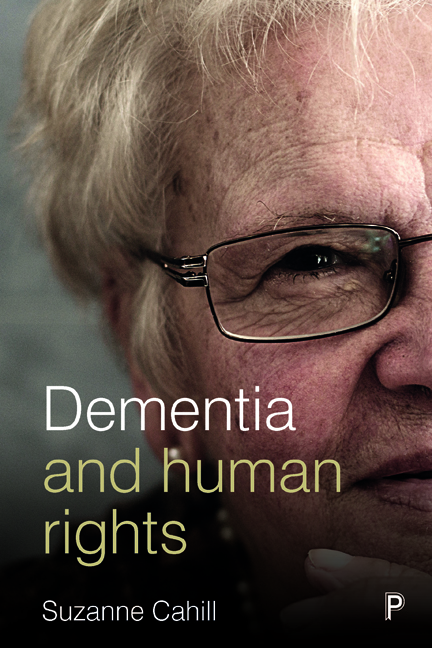five - The right to a good quality of life in care homes or in nursing homes
Published online by Cambridge University Press: 22 April 2022
Summary
The elderly individual wandering the street is easily identified as homeless yet there is an entire population of elders who suffer silently enduring the painful state of homelessness within the confines of the total institution of the nursing home. (Carboni, 1990, p 37)
Introduction
In this chapter the focus shifts from care at home to support in a nursing home or care home where many older people who have a more moderate to severe dementia live. There is evidence to suggest that people with dementia are over-represented amongst nursing home and care home residents (ADI, 2013). For example over two thirds of people living in care homes or nursing homes in Ireland, the US and England probably have dementia (Cahill et al, 2010; Alzheimer's Association, 2012; Prince et al 2014).
According to the ADI (2013), care homes for people living with dementia typically consist of, ‘residential care, or assisted living facilities staffed by care assistants … nursing homes, staffed by registered nurses as well as nursing and care assistants … [and] dementia special care units [SCUs] staffed by specialist dementia nurses, and attended by multidisciplinary care teams … for those with advanced dementia…’ (ADI, 2013, p 33). Despite policy drives over the last two decades in some European countries, especially the Netherlands (Verbeek, 2013), to increase the provision of SCUs, most people in Europe and in the US who need long-term care because of dementia live in residential homes or care homes (Alzheimer Europe, 2013; Harris-Kojetin et al, 2013; Cahill et al, 2015a).
A care home is a person's home, their permanent place of residence for an indefinite period of time. How, with whom, and where the individual spends their time and the quality of their interactions there (Harmer and Orrell, 2008; Theurer et al, 2015) will significantly impact on quality of life (Moyle et al, 2015; Jing et al, 2016). Building on the work of Kitwood (1997a), who located ‘behaviours that challenge’ not in the brain but in the individual's emotional ill-being, it is argued that despite policy plans that purport to promote quality in residential care (ADI, 2013), the biomedical model for contextualizing dementia prevails, and some individuals living with dementia in care homes are being exposed to suboptimal and at the extreme, harmful practices, and to regimes of control and restriction (Alzheimer Europe, 2012).
- Type
- Chapter
- Information
- Dementia and Human Rights , pp. 99 - 130Publisher: Bristol University PressPrint publication year: 2018



